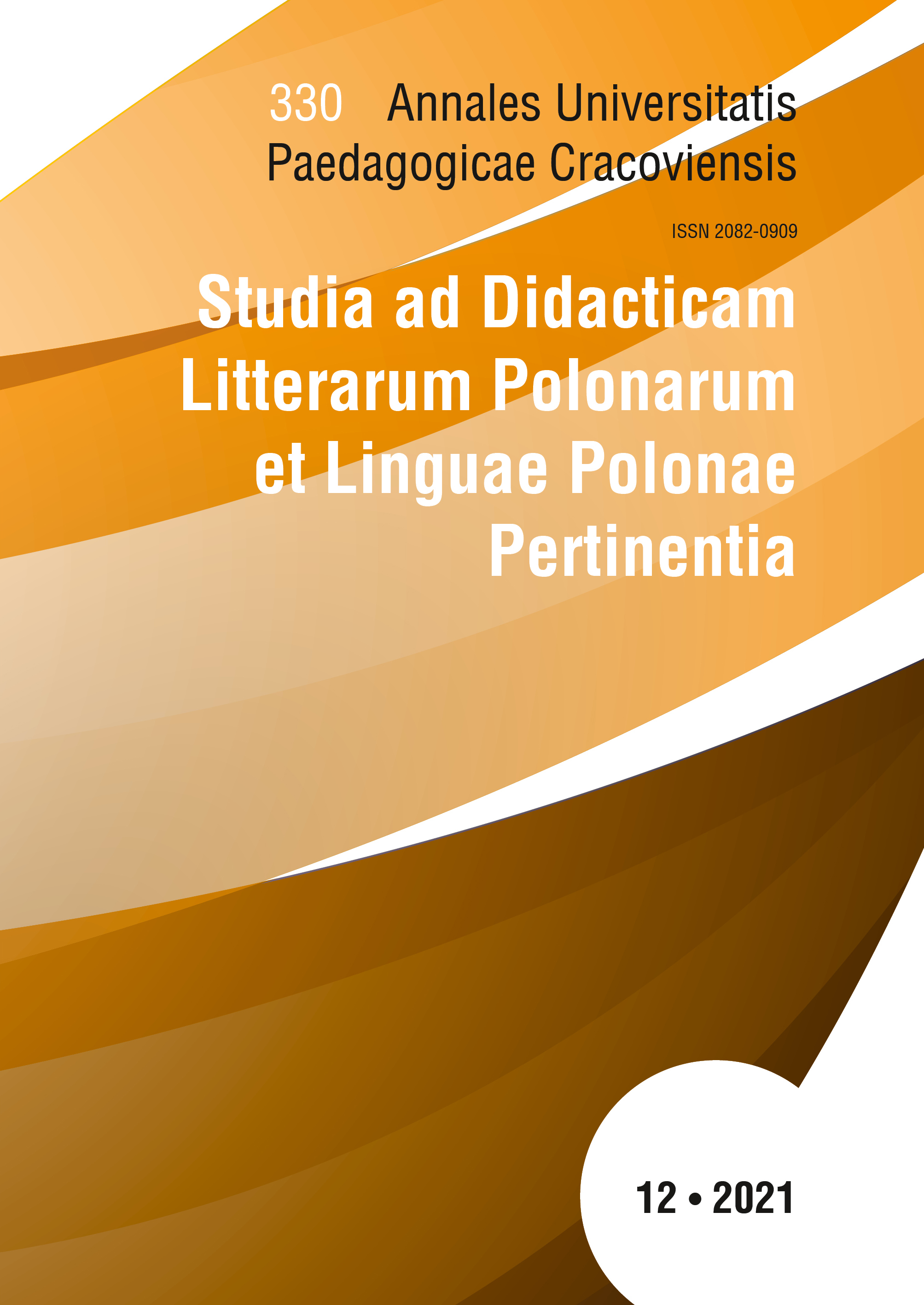Abstrakt
The aim of the article is to draw attention to the necessity of creating conditions for linguistic development for students in all school subjects. The basis here is to define the language of schooling as a functional variety of language that is used in school contexts in communication between teachers and students, school textbooks and other educational materials. The article explains and illustrates with examples the basic features of the language of schooling that distinguish it from the language of communication. Support for targeted activities aimed at developing the linguistic competence of students in spoken and written form are also provided by the core curriculum for all subjects, as shown on the example of biology and physics as a school subject.
Bibliografia
Ahrenholtz B., Fachunterricht und Deutsch als Zweitsprache, 2010, https://download.e-bookshelf.de/ download/0002/5629/68/ L-G-0002562968-0003846756.pdf [dostęp: 12.12.2020].
##plugins.generic.googleScholarLinks.settings.viewInGS##
Baker S., Simmons D.C., Kame’enui E.J., Vocabulary acquisition: Research bases, [w:] What reading research tells us about children with diverse learning needs: Bases and basics, red. D.C. Simmons, E.J. Kame’enui, Mahwah, New York 199, s. 183–218.
##plugins.generic.googleScholarLinks.settings.viewInGS##
Bakuła K., Mówione=pisane: komunikacja, język, tekst, Wrocław 2010.
##plugins.generic.googleScholarLinks.settings.viewInGS##
Beck I.L., McKeown M.G., Kucan L., Bringing Words to Life: Robust Vocabulary Instruction, New York 2013.
##plugins.generic.googleScholarLinks.settings.viewInGS##
Bernstein B., Odtwarzanie kultury, Warszawa 1990.
##plugins.generic.googleScholarLinks.settings.viewInGS##
Blachowicz C.L.Z., Fische P., Ogle D., Watts Taffe S., Nauka słownictwa akademickiego K-8: Skuteczne praktyki w programie nauczania, New York 2013.
##plugins.generic.googleScholarLinks.settings.viewInGS##
Carrier S.J., Effective strategies for teaching science vocabulary, North Carolina 2011.
##plugins.generic.googleScholarLinks.settings.viewInGS##
Dugan Ch., Strategies for Building Academic Vocabulary in Science, Huntington Beach, 2004.
##plugins.generic.googleScholarLinks.settings.viewInGS##
Feilke H., Schulsprache, 2019, https://epub.ub.uni-muenchen.de/61964/1/Feilke_Schulsprache.pdf [dostęp: 10.05.2020].
##plugins.generic.googleScholarLinks.settings.viewInGS##
Gajda S., Podstawy badań stylistycznych nad językiem naukowym, Warszawa 1982.
##plugins.generic.googleScholarLinks.settings.viewInGS##
Gajda S., Podstawy badań stylistycznych nad językiem naukowym, Wrocław 1982.
##plugins.generic.googleScholarLinks.settings.viewInGS##
Gajda S., Wprowadzenie do teorii terminu, Opole 1999.
##plugins.generic.googleScholarLinks.settings.viewInGS##
Gajda S., Słodzińska A., Struktura językowa podręcznika, [w:] Podręcznik literatury w szkole średniej. Wczoraj – dziś – jutro, red. B. Chrząstowska, Poznań 1991, s. 117–135.
##plugins.generic.googleScholarLinks.settings.viewInGS##
https://www.coe.int/en/web/ platform-plurilingual-intercultural-language-education/ languages-of-schooling [dostęp: 06.09.2020].
##plugins.generic.googleScholarLinks.settings.viewInGS##
Le français langue seconde – de scolarisation, 2013, https://www.france-education-international.fr/ sites/default/files/migration/ bibliographie/bibliographie_FLS.pdf [dostęp: 12.12.2020].
##plugins.generic.googleScholarLinks.settings.viewInGS##
Nagy W.E., Anderson R.C., How Many Words Are There in Printed School English?, “Reading Research Quarterly, 1984, vol. 19, nr 3, s. 304–330, www.jstor.org/stable/747823 [dostęp: 17.06.2020].
##plugins.generic.googleScholarLinks.settings.viewInGS##
Nocoń J., Podręcznik szkolny w dyskursie dydaktycznym – tradycja i zmiana, Opole 2009.
##plugins.generic.googleScholarLinks.settings.viewInGS##
Podstawa programowa kształcenia ogólnego, https://podstawaprogramowa.pl/Liceum-technikum [dostęp: 10.10.2020].
##plugins.generic.googleScholarLinks.settings.viewInGS##
Schleppegrell M.J., Introduction to the Special Issue, “The Elementary School Journal” 2012, nr 3 (112), s. 409–418.
##plugins.generic.googleScholarLinks.settings.viewInGS##
Schleppegrell M.J., The Language of Schooling. A Functional Linguistics Perspective, Mahwah, New Jersey 2004.
##plugins.generic.googleScholarLinks.settings.viewInGS##
Skubalanka T., Rola języka mówionego i pisanego, [w:] Język polski. Poprawność, piękno, ochrona, red. S. Urbańczyk, Bydgoszcz 1969, s. 9–18.
##plugins.generic.googleScholarLinks.settings.viewInGS##
Snow C.E., Ucceli P., The challenge of academic language, [w:] The Cambridge Handbook of Literacy, red. D.R. Olson, N. Torrance, Cambridge 2009, s. 119–120.
##plugins.generic.googleScholarLinks.settings.viewInGS##
Sprenger M., Teaching the Critical Vocabulary of the Common Core: 55 Words That Make-or-Break Student Understanding, brak miejsca wydania 2013.
##plugins.generic.googleScholarLinks.settings.viewInGS##
Straube P., The notion of style in physics textbooks, “JRST” 1989, nr 4 (26), s. 291–299.
##plugins.generic.googleScholarLinks.settings.viewInGS##
Teaching Academic Content and Literacy to English Learners in Elementary and Middle School, 2014, https://ies.ed.gov/ncee/wwc/ Docs/practiceguide/english_learners_pg_040114.pdf [dostęp: 06.09.2020].
##plugins.generic.googleScholarLinks.settings.viewInGS##
Thürmann E., Deutsch als Schulsprache in allen Fächern. Konzeptezur Förderung bildungs-sprachlicher Kompetenzen, 2011 file:///Users/marta2/Downloads/183897_Deutsch_als_Schulsprache_in_allen_Fchern_Thrmann%20(2).pdf [dostęp: 12.12.2020].
##plugins.generic.googleScholarLinks.settings.viewInGS##
Wilkoń A., Typologia odmian językowych współczesnej polszczyzny, Katowice 2000.
##plugins.generic.googleScholarLinks.settings.viewInGS##

Utwór dostępny jest na licencji Creative Commons Uznanie autorstwa – Użycie niekomercyjne – Na tych samych warunkach 4.0 Międzynarodowe.
Prawa autorskie (c) 2021 Annales Universitatis Paedagogicae Cracoviensis. Studia ad Didacticam Litterarum Polonarum et Linguae Polonae Pertinentia


